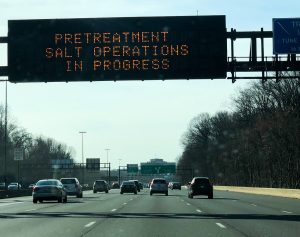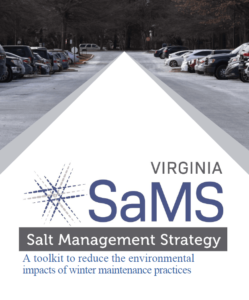De-icing and Anti-icing Chemicals
Interstate Commission on the Potomac River Basin
 De-icing and anti-icing chemicals provide benefits by preventing roadway accidents and slips and falls, but also negatively impact the environment, human infrastructure, and sources of drinking water. Salt is the most commonly used form of de-icing chemical. As the use of these chemicals has increased in recent years, so too have our expectations for getting around during winter storm events and our awareness of associated negative impacts.
De-icing and anti-icing chemicals provide benefits by preventing roadway accidents and slips and falls, but also negatively impact the environment, human infrastructure, and sources of drinking water. Salt is the most commonly used form of de-icing chemical. As the use of these chemicals has increased in recent years, so too have our expectations for getting around during winter storm events and our awareness of associated negative impacts.
ICPRB is involved in a few efforts to promote sensible treating of roads, parking lots, and walkways.
Potomac Drinking Water Source Protection Partnership
Potomac DWSPP has long been concerned about the impact of chlorides on drinking water supply infrastructure and on the treatability of the source water. As the DWSPP coordinator, ICPRB facilitates meetings and assists members in achieving their goals. DWSPP maintains a website with information on how de-icing and anti-icing chemicals can impact drinking water.
Winter Salt Reduction Program at MDE
ICPRB is assisting Maryland Department of the Environment (MDE) in the development of a training manual for progressive winter maintenance that will be used by MDE’s winter salt reduction program. The manual is expected to provide information on how various stakeholder groups can proactively manage winter salt use on parking lots, sidewalks, and non-highway roads.
Virginia Salt Management Strategy
Virginia Department of Environmental Quality (DEQ) developed a salt management strategy (SaMS) for northern Virginia as a means of addressing a chloride impairment in Accotink Creek. An extensive stakeholder process was used to foster a collaborative effort to meet the chloride loads specified in the Accotink Creek total maximum daily Load (TMDL) and address salt application in the region. Learn more about the process on DEQ’s salt management strategy development page.
ICPRB assisted DEQ with the development of the Accotink TMDL and supported the SaMS process. In collaboration with DEQ, ICPRB prepared the following documents:
- Salt Management Strategy Toolkit
 Chloride TMDLs for the Accotink Creek Watershed
Chloride TMDLs for the Accotink Creek Watershed- Environmental Impacts and Potential Economic Costs and Benefits of Improved Management Practices in Northern Virginia

